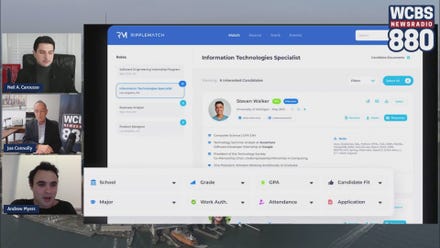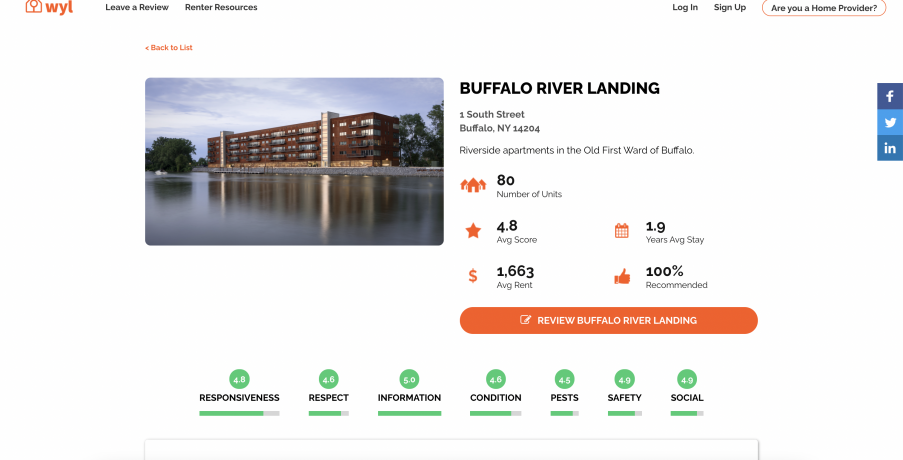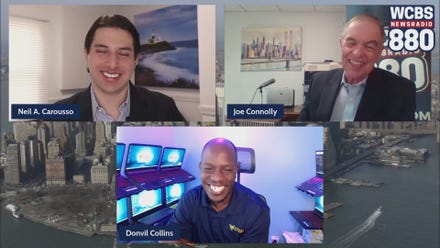
Neil A. Carousso produces NewsNation original “Kurt’s Country” – a celebration of country music and a slice of Americana with host Kurt Bardella.
-
RippleMatch Platform Improves Early Career Hiring Process
Posted by: Neil A. CaroussoPost Views: 934By Joe Connolly and Neil A. Carousso
NEW YORK (WCBS 880) — RippleMatch helps college students and recent graduates launch their careers while improving employee retention rates by using data to find the best fit.
“If you’ve ever had the experience of applying for a job, it’s often that you throw your resume into a black hole and just sort of hope that someone maybe gets back to you,” said RippleMatch founder and CEO Andrew Myers on the WCBS Small Business Spotlight, sponsored by Dime Community Bank.
“With RippleMatch, you know, we only present opportunities on the platform when a candidate’s very likely to be a good fit. They generally hear back really, really quickly. They always get an answer,” he said.
Myers said that 66 percent of candidates on RippleMatch have gotten called for an interview.
He founded the company in 2015 in his dorm room at Yale University after feeling dejected when he only got three or four job interviews out of 55 applications. Calling the process “overwhelming” and “daunting,” Myers sought a better way for his peers using data predictive analytics to match early career candidates with jobs where they are most likely to succeed.
“Our mission (is) to replace job boards,” he said.
RippleMatch is free for candidates. It earns all its revenue from employers that now include Amazon, eBay, and Ernst & Young.
“One of the deals we make with every company that we work with is they commit to certain standards in terms of candidate experience and how they’re going to get back to candidates, and very typically prioritize the RippleMatch candidates that they’re getting matched with in terms of getting them into the interview process,” said Myers. “We just establish workflows on the back end that sort of get candidates into the company as fast as we possibly can, which is generally an advantage when it comes to candidate experience.”
He said retention rates among Gen Z employees that used RippleMatch are much higher as a result.
“The single thing (Gen Z employees) want most is professional development,” Myers said, continuing, “Within our own Gen Z workforce, we’ve seen really good retention within roles and I know a lot of our stronger companies have as well. So I actually think that good professional development with Gen Z employees can actually be a pretty effective strategy even in the heart of the Great Resignation. And, I think that there’s actually more shifting going on in sort of later stage positions than there are with Gen Z compared to millennials who are already pretty jumpy themselves. There’s not like a big Gen Z jump or anything like that that we’re seeing.”
He said RippleMatch has upended the belief that the best talent comes from prestigious universities and it has the data to support it.
“If you’re clinging to the notion that a candidate had to go to Princeton or you’re over attached to degree pedigree, I think it can actually mean you miss out on phenomenal talent,” said Myers.
See how RippleMatch works for both job candidates and employers on the WCBS Small Business Spotlight video above.
-
Whose Your Landlord Introduces Transparency, Accountability to Residential Rental Market
Posted by: Neil A. CaroussoPost Views: 656By Joe Connolly and Neil A. Carousso
NEW YORK (WCBS 880) — This business is redefining the landlord-tenant relationship.
While studying entrepreneurship, management and information systems at Temple University, Ofo Ezeugwu saw first-hand that the trust between landlords and tenants was broken. He thought there had to be a better system, and in 2015, he founded Whose Your Landlord.
“Housing started coming up a lot as we were talking to students,” he explained to Joe Connolly and Neil A. Carousso on the WCBS Small Business Spotlight, sponsored by Dime Community Bank.
“There was (sic) so many issues around infestation or harassment between male landlords and female residents,” Ezeugwu said. “Things that, you know, quite honestly, no one should go through.”
As a first-generation American whose mother is from Barbados and father is from Nigeria, he was motivated to make an impact and solve a glaring problem in the residential rental market.
“At first, I thought there had to be some way just to review landlords so you knew what to expect before signing your lease. And honestly, as we built that out, there was (sic) so many other value-adds that having that insight be more prevalent in this industry,” said Ezeugwu.
Whose Your Landlord launched in New York and Pennsylvania where he was attending school at Temple. Today, it is available in 400 cities with 25,000 different landlords and property managers reviewed on the platform.
Tenants share their experiences in an apartment building, which informs others looking to rent. Reviews are vetted so it is appropriately mixed between positive and negative, and topics range from the landlord-tenant relationship to living conditions.
“We see ourselves as being the number one used platform when it comes to resident reviews and analyzing resident insights for home providers,” Ezeugwu said, adding, “We also see ourselves really shifting that culture, that relationship between residents and home providers, forever.”
This year’s Forbes 30 Under 30 winner for social impact told WCBS 880 he has observed rental conditions improving in Charleston, SC, Dallas and Houston, TX.
“I think if we can kind of recreate how we think about our industry as a collective, it’s only going to lead to more positivity.”
He said landlords benefit, too, from data that helps them provide better service and grow their real estate businesses.
“They’re actively asking, ‘We want feedback. We want insights. Please share that with us,'” said Ezeugwu.
Some of the analytics Whose Your Landlord collects and provides property owners for a fee, include complaint trends from appliances being out of service to snow and ice removal.
The company also sells advertisements on its website to major brands who can further serve tenants.
“So if you are Allstate, you know, renters insurance is huge and it’s actually pretty cheap comparatively to other insurances. So, why not protect your apartment and your car if people don’t usually often realize your car gets broken into that covers it, too?” said Ezeugwu of one brand partnership.
“We would create content like that that helps support renters,” he said. “It was always adjacent to their experiences so that it would be more valuable to them as a(n) overall platform.”
See more about Whose Your Landlord and get growth ideas for your business on the WCBS Small Business Spotlight video above.
-
Something Special for Valentine’s Day
Posted by: Neil A. CaroussoPost Views: 698Produced by Carousso Enterprises, LLC and NY2C Corp.
NEW YORK, NY — Let’s get it on.
Did Valentine’s Day sneak up on you this year? It’s not too late to get the perfect gift.
On NY2C’s What’s Up New York, Alycia Powers has you covered with great places to get started, including the independent Marla Aaron Jewelry brand located in New York’s Diamond District.
NY2C’s flagship digital series “What’s Up New York” is produced and written by Carousso Enterprises, LLC.
-
The Cost of Inflation: Consumers Face Higher Prices for Food, Household Items
Posted by: Neil A. CaroussoPost Views: 745Produced by Neil A. Carousso
NEW YORK (WCBS 880) — American consumers are facing the brunt of inflation.
Prices for food, cars, and household furniture and appliances are responsible for much of the 7.5 percent annualized inflationary surge. Wage pressures resulting from the tight labor market could push inflation higher, too, as WCBS anchor Steve Scott discusses with CNBC senior economic reporter Steve Liesman on The 880 Weekly Rewind.
-
How to Create ‘FOMO’ in Virtual Events to Grow Sales
Posted by: Neil A. CaroussoPost Views: 574By Joe Connolly and Neil A. Carousso
NEW YORK (WCBS 880) — No one wants to feel left out.
Some businesses have been thriving in the digital space and using virtual events to drive sales. While virtual events allow companies to reach audiences outside their normal radius, combating Zoom fatigue can be the biggest barrier.
VeeKast president and CEO Donvil Collins’ advice: “Find some way to give your viewers 10 seconds of fame.”
He told Joe Connolly and Neil A. Carousso on the WCBS Small Business Spotlight, sponsored by Dime Community Bank, that people on the other end of the computer need to feel like they are part of an experience. It won’t be successful if it’s one-way communication.
“Especially thinking about the chat, can people respond? Are people in the broadcast able to respond to the people that are watching?”
One of VeeKast’s clients, Collins said, had been drawing about 400 people for in-person events pre-pandemic. It had a live audience of 2,000 people online and they got more than 6,000 views of its event on-demand.
“Really part of what they did was creating what I like to call ‘FOMO,'” he said of the acronym that stands for “Fear of missing out.”
“That’s one of the big things that organizations are missing sometimes and not only getting people to watch it live and not feel like they’re just watching, they’re actually a part of this event. It’s not a production, it’s an event,” Collins explained, continuing, “And then for the replay, it’s ‘What did you miss? What’s the big deal?’ So I think FOMO is a big part of driving engagement, views, and all of that.”
VeeKast was founded in 2013 as an in-person events and video production company based in White Plains, NY. Collins made commercials and other advertising while also producing some livestreaming events. By focusing on virtual events during the pandemic, Collins said they doubled their business both in 2020 and 2021 from the year prior.
“Our goal for this year is we’re just going to push it and try to triple the business,” he said. “At least from what we’re seeing in an increase, there’s a lot of opportunity there because there’s so much need for help. People want to get this stuff done, but they don’t really know how, and they just need a single mind or a managerial company or someone that can come in with all the gear and actually help them do it well.”
VeeKast prides itself on producing virtual events that look like the Academy Awards with overlay designs and professional audio/video equipment they supply as part of a “remote broadcast kit.”
“We send a lavalier mic, we also send tripods and we send them a link that we can control the camera equipment remotely,” said Collins.
“From your offices in Westchester, you’re running a whole TV network like a control room now,” noted Connolly.
“There’s some that was (sic) international locations in Europe and other places and we are controlling the gear that is there so we can get the quality of the recording to be better.”
See ways businesses are leveraging broadcast quality virtual events to grow sales on the WCBS Small Business Spotlight video above.











